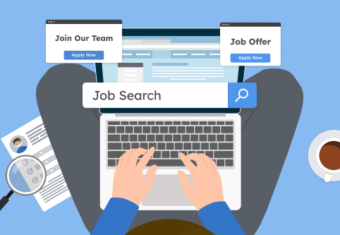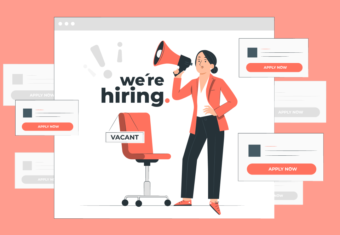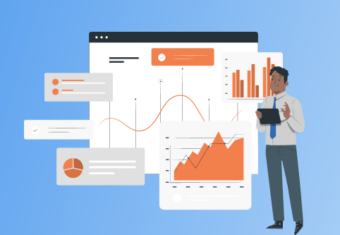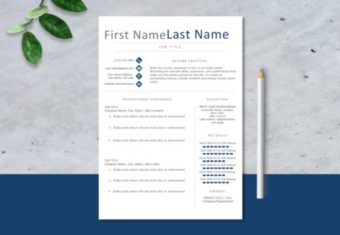Our career advisor Corissa Peterson recently sat down with Bonnie Dilber, Recruiting Leader at Zapier and one of LinkedIn’s Top Voices, to discuss best job-hunting practices in 2023. Below you’ll find excerpts of their conversation covering everything job seekers need to know about:
- Writing a resume that gets recruiters’ attention
- Positioning yourself to land a remote or tech role
- Networking effectively
- Impressing your interviewer
- Navigating a difficult job search in 2023
Note: Quotes have been edited for clarity and brevity.
Meet Bonnie Dilber
Bonnie Dilber is the Recruiting Manager at Zapier, a tech company that helps businesses scale successfully by providing customizable workflow automation solutions. She leads the business recruitment team in filling all of the business’ non-technical roles.
Bonnie started out in teaching before gravitating toward a talent acquisition role. With 9 years of experience, Bonnie’s recruiting career spans the tech, education, and non-profit sectors. She’s passionate about promoting equity in the workplace and shares her insights on LinkedIn to her 340,000+ followers.
As one of LinkedIn’s Top Voices, Bonnie is an excellent person to follow for job-seeking and career insights. Check out some of her advice below.
How to write a standout resume
We asked Bonnie to share her insights on what makes a great resume, from the best resume format and how long your resume should actually be to whether or not job seekers should worry about applicant tracking systems (ATS) in 2023:
What do you think is the best resume [format] for job seekers in 2023?
I think people can stress out a lot about their resumes and getting the perfect resume. And I would say the format doesn’t matter. What matters most is having your experience really pop and be easy to find.
When a recruiter does that initial scan of a resume, they are spending, you know, 10 seconds, 15 seconds, very quickly looking so they can figure out if this person has enough of an alignment with the role for them to keep looking further and actually read the whole resume. And so within those few seconds that you have, you want your most relevant experiences to jump out at them and you want to have a couple of metrics and successes that are going to stand out.
I think more than anything, having a resume that is clean and isn’t cluttered with graphics and designs can really help so that the recruiter can very quickly focus on what experience you have and how that aligns with what they’re looking for.
Do you think functional resumes can be helpful for job seekers if they don’t have much experience?
I think a functional resume can be useful. I do think a lot of recruiters have biases against them because often [they] want to just see what job titles you’ve had. They want the shortcut. So erring more toward a traditional resume is probably going to be easier.
But if your experience is really varied, then a functional resume where you cluster your [experience] by skills can be helpful. I think a lot of people go toward really soft skills. They just want to talk about something like communication or collaboration – those don’t really carry much weight [or] tell us very much.
If you are going to do something like that, then we’re looking for skills that are backed up with meaningful examples of how you’ve [used them and] had an impact. For example, project management could be a meaningful functional skill that you’ve applied across multiple roles. Maybe you never had that project management title, but you can really show how you’ve done that in multiple ways.
How long should a resume really be?
I think generally two pages is sufficient for like 95% of people. That said, if your resume is three pages, it’s not like someone’s going to reject you because you have a three-page resume. But they’re also probably not even going to look at that third page. Most of their time is going to be spent on the first page.
If you are early career, you just graduated college, you’ve had one job – one page is fine. If you’re going to two pages, that probably means you’ve got a lot of fluff.
But I think the majority of people should be able to fit the most important things about their experience on two pages. And if it gets longer than that, it’s probably not going to get read.
Do you think it’s important to optimize your resume for applicant tracking systems (ATS)?
Yes and no.
I think that this gets overblown. The whole thought that ATS are preventing recruiters from even seeing resumes. That doesn’t really happen. However, there are a couple of things that I’ve seen.
One is sometimes when people have a weird resume format – maybe they’ve pulled it off Canva, maybe it’s not saved as a PDF and they’ve done it on Apple pages or something – it will actually show up as weird. Do you guys remember that font Wing Dings? It will actually be that font sometimes, or some version of that. So sometimes literally the resume format does not read on the ATS [and the recruiter has] to download and open it, and that extra step could just prevent them from looking at your resume. That’s why I say just have a clean format. If it’s a PDF that will often just be easier.
There are some applicant tracking systems that scan for keyword matches and will assign a percentage match to a resume and sort of stack rank them. I know most recruiters take that with a grain of salt, so they’re ultimately going to look at all of them.
They don’t just reject everything below a certain percentage, in my experience, having used some of those systems and [based on] what people told me they do. But knowing that, I think having language [on your resume] that matches the language that will be used for the job is going to be helpful.
Advice for targeting remote and tech roles
As the Recruiting Manager of a large tech company, we wanted to ask Bonnie how job seekers can effectively target remote and tech roles. Here’s her advice:
How would you suggest candidates strengthen their resume for a remote role?
So the biggest thing [is] – and I’ll just be really honest – unfortunately, remote roles constitute something like 13-15% of the roles that are posted, but they’re receiving over 50% [of overall applications], at least on LinkedIn.
So essentially it is highly, highly competitive, and that’s why I say when you’re going for remote roles, you need to be applying for roles that you are pretty much 100% qualified for. You’ve done that job, you’ve worked in that industry.
It is really hard to make your career transition into a remote environment. That is both because it’s competitive, because they can hire from such a broader candidate pool and they can be picky and find really qualified candidates, but also because it can be harder to train someone in a remote environment.
So companies may be a little more resistant to hiring someone who has never done anything before, or it’s their first job, because they’re not going to be able to be right there to support them, to answer questions. They’re going to have to figure that stuff out from the comfort of their own home. That can be hard if you’ve never done a job before. So being able to show that you’ve pretty much already done that job on your resume is really important for a remote role.
If you can accompany that resume with a message to the recruiter or hiring manager that lets them know to check out your application and tells them a little bit about your interest, I think that can help as well.
Do you think it’s necessary to have proven remote experience?
I don’t think you necessarily have to have remote experience, although I know a lot of remote companies will ask you about that.
I had worked a job that was hybrid/remote. I worked from home but then traveled, so I was with my team a lot more frequently. But I talked a lot about the ways that I had managed my team and worked with my team across different states, different time zones, [and] how I collaborated with people I had never met before, [and] built relationships.
I think if you can speak to those things, even if you haven’t been totally remote, being able to show that you understand what may be some unique challenges in a remote environment and how you’ve overcome those [can help]. Even if it was in a hybrid environment, even if it was on site. You’re able to show how you use technology, things like that.
What advice would you give to job seekers looking for roles in tech?
[My advice is to] think about why you want to be in tech. I think for a lot of people it just feels like a cool space to be in. They think it pays really well, a lot of tech companies have disproportionately more remote jobs, I think it’s more about that stuff.
But a lot of the jobs you can do in tech, you can do anywhere, even the really technical roles – you can be a data engineer at non-tech companies. I worked at a nonprofit for years and was paid really well and traveled and worked from home a lot. So recognize that a lot of the stuff you think you’ll get in tech, you can actually get in lots of other environments as well.
If you haven’t worked in tech before, it’s hard right now to make that transition because so many people who have experience in tech have been laid off and are on the market, and so it’s just competitive. So I do think people should think about other fields. If they do want to move into tech and they haven’t worked in tech before, they need to show how they’re at the top of their game and super qualified.
Tips for getting started in networking
Bonnie is a networking expert and, as one of LinkedIn’s Top Voices, has a thing or two to say about reaching out to someone for a connection. Here’s some of her advice on best networking practice:
Do you have tips for what’s good networking practice [and] how to start?
One [tip] is you just have to do it and be comfortable with rejection. I feel like people in sales and recruiting know this and nobody else does – that the vast majority of emails you send, the vast majority of DMs [or] LinkedIn messages you send go unresponded to.
In recruiting, we know if you can get a response on 20% of your outreach to candidates, you’re actually doing it, that’s amazing. I think 10% is even a pretty good number. Email marketers know this too. Most people do not open emails from people they don’t know, so don’t get disappointed, don’t feel rejected. If you send two messages and don’t get any responses, that’s really normal. So recognize there is a little bit of a numbers game. If you send ten messages and get one response, you’ve done great.
Another [tip] is to make a small ask. A lot of people will come in and just send a message and ask to meet with someone. A meeting is big. You’re asking someone to give you time. Often you may be asking them for free labor. A lot of times people want to pick my brain and what they really want is coaching and all of that – they’re wanting someone to invest time into [them]. That can feel like a lot.
…I think you can make a small ask. For example, in that first email or message letting someone know, “Hey, I’ve been following you, I’m really interested in your company, or I’m interested in transitioning into the field that you’re in. Can I ask you a couple of questions?” and then ask them two easy questions they can respond via email. Most people are much more likely to respond to that. And you’re not asking them for their career journey, [just] small things that will get a response.
Once you open that line of communication with them, then you might be able to work your way up to asking for a meeting. They might offer a meeting or you can build like more of a relationship. But I think keeping that first ask small is one of your best bets because they’re more likely to respond if it’s something they can do in three or four minutes of their time versus an hour of their time.
Do you think putting that first ask right at the start is the way to go?
I think it can [be]. I think doing a little bit of sucking up to people in some way, giving them flattery [can help]. People tend to appreciate a thank you, an “I love your content” or “I saw that your company worked on this project and it was really cool and caught my attention. That’s why I want to work at your company.” Something that’s going to make them feel good and flattered tends to get more of a response.
And then you can always say, “Hey, I’m actually interested in opportunities with your company. Could I ask you a few questions?” That sort of thing I think is fine to add in the first message. Keep in mind with LinkedIn, with InMail, I think you’re only able to send one initially. And then if they don’t respond, you can’t keep messaging them.
So I also think on that front, keeping it light and easy for them to respond to helps because again, if you have a really big ask, they’re probably just going to ignore it.
Strategies for success in your interview
It’s easy to get nervous before an interview, and how many of us actually spend the time to prepare properly? Bonnie walks us through some of her top interview tips to make sure you nail your next interview.
Do you have recommendations for the best ways to prepare for an interview?
One is [using] some interview question guides. Glassdoor I like because you can actually look up the company, look up the job, and you can see reviews on the interview from people previously who have done the interview. So I recommend looking through that, I did that when I was interviewing. Check out what questions you can expect so you can prepare in advance.
There are some questions you can anticipate. You’re always going to be asked to share a little bit about your path to where you are today or walk them through your resume. So prepare for that. You will always be asked if you have any questions for them. Prepare those questions in advance.
Certain things you’re always going to be asked to talk about – a goal that you achieved, a goal that you missed, a failure at work, or a conflict with a colleague. You know you’re going to be asked questions like that. So I recommend preparing some stories in advance so that when [these questions] get asked, you’re not flustered, you’re ready to go. You’ve already practiced that story.
The STAR method is: situation, task, action, result. But essentially it’s –
- Tell them the problem that you were up against.
- Tell them what you did about it.
- Tell them what happened, what you learned from that experience, and what you might do differently.
You can expect that you’re going to be asked “Tell me [about] a time when…” [questions]. So come ready with those stories that [follow] that format of problem-action-solution, and be ready to walk through that.
When I’m in interviews I have some of my stories and examples on a Word doc in the background, and I’m able to glance at those and be like, “That’s what I’m going to talk about.” So, you know, have those cheat sheets, if you have the luxury of a virtual interview.
Always feel free to pause to think about like an example. It’s not only acceptable and expected, but actually shows maturity and self-awareness – when you say “Let me think for a minute.” I’ve done interviews where I’m down the path of a story and I’m like “You know what? This isn’t a great example. Do you mind if I back up?” and I’ve still gotten hired.
So it is okay in an interview to say, “Hey, I messed up” or check in, like “Does this sound like a relevant example or would you want me to share something else?” It is perfectly okay to engage with your recruiter in that way, so if the interview is going off the rails, stop and say, “Hey, can we pivot?”
Ask clarifying questions if you’re unclear on what they want instead of guessing. Say “Hey, can you tell me a little bit more about like what you’re looking for?” so that you’re able to really answer.
With interviews, I’ll often expect that they’re going to ask a lot of probing follow-up questions, so I may not share everything up front. Well, if they don’t ask a question, then I’m like, “Oh gosh, I thought I was going to get to talk about this and this. They didn’t ask about it.” So I might say, “Hey, am I giving you the level of depth that you want or can I go into more detail?”
That sort of thing can kind of help you and the recruiter level set or adjust.
What about after the interview? Should a candidate send an email, a thank you note, a follow-up?
Yeah, I think it is a great move to send a thank you note. I will say I don’t think that’s required. Most candidates don’t do it, but I think it’s a good move for two reasons. One is [that] it reminds them of you, and people always like getting a thank you.
But it also actually gives you an opportunity to address anything [from the interview], maybe you wish you had given a different example, [or] you didn’t answer a question very well.
The thank you note gives you a chance to correct yourself and say something like, “I was thinking about when you asked me about a mistake I made and I talked about this, but I wish I would have also shared that after that mistake, [I took these] three steps so it never happened again. I just wanted to share that with you.” Or, “When you asked if I had experience working with multiple CRMs, I said no. But actually, I’ve worked with these three tools.”
Whatever it is, you have a chance in that thank you note to sort of correct anything that maybe didn’t go as well as you wanted.
One last tip for job seekers
To wrap up our informative discussion, we asked Bonnie to give job seekers one last piece of advice.
If you could give only one tip to job seekers today, especially ones who have been on the job hunt for a while, what would it be and why?
I would say it’s not you, it’s the market. I know so many amazing people who have the best resumes and experience who right now are struggling to even get interviews, just because it’s a tough market. So don’t take it personally and remember that it’s okay to maybe just take a job that’s going to be a job for right now and not your dream job.
Like I said, right now’s not the time for career transitions. Right now is probably not the time to pursue a big promotion. It might happen, go for it, but also know that you might just need to take a job that’s not the best job, but is going to get you through the next year or buy you a bit more time so you can spend more time applying for the jobs you really want.
I see some people who are who put a lot of pressure on themselves that they have to get this great opportunity or they have to transition, and I just think it’s a really tough market. So sometimes you can moderate your expectations a little bit and realize that you can take something that’s going to be a just-for-now job and keep working toward your dream job as your next move.
About Resume Genius
Since 2009, Resume Genius has combined innovative technology with leading industry expertise to simplify the job hunt for people of all backgrounds and levels of experience.
Resume Genius’s easy-to-use resume builder and wide range of free career resources, including resume templates, cover letter samples, and resume writing guides, help job seekers find fulfilling work and reach their career goals. Resume Genius is led by a team of dedicated career advisors and HR experts and has been featured in The New York Times, Forbes, CNBC, and Business Insider.
For media inquiries, please contact us.
Build your resume in minutes
Use an AI-powered resume builder and have your resume done in 10 minutes. Just select your template and our software will guide you through the process.















